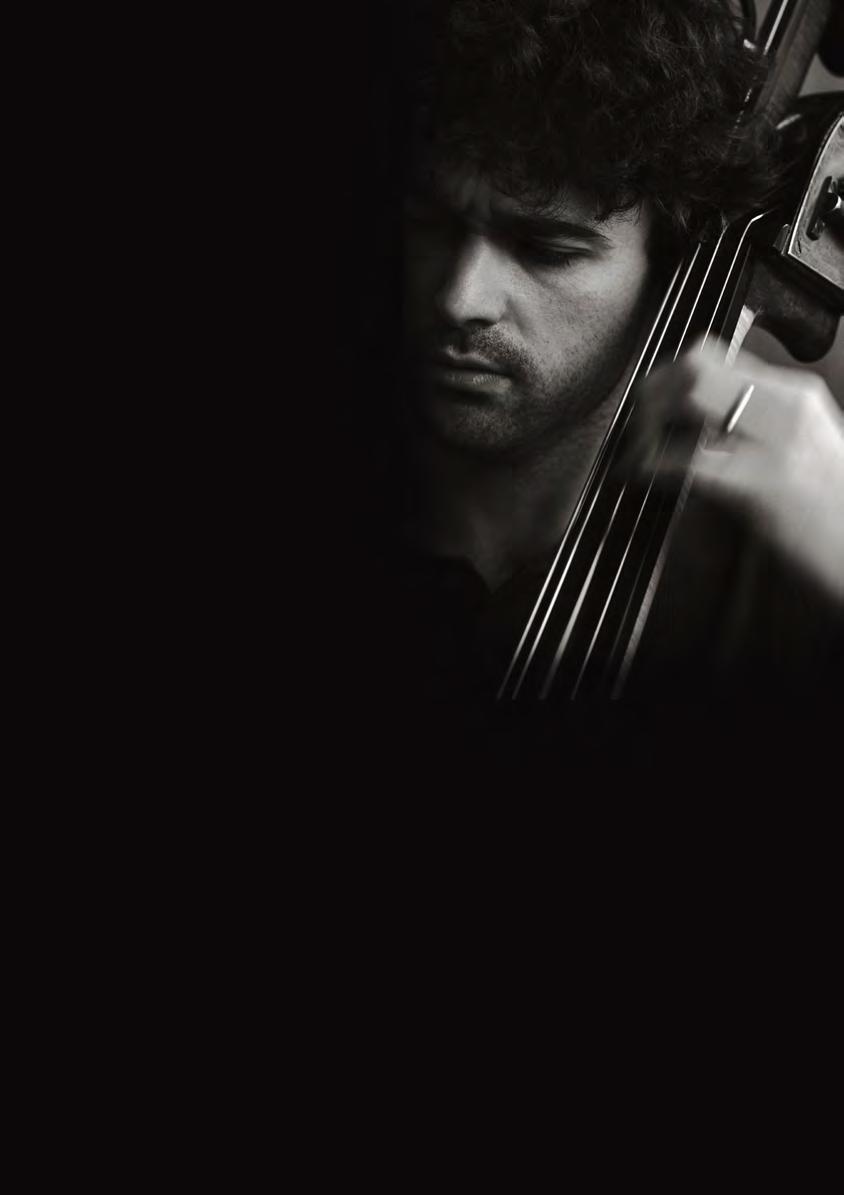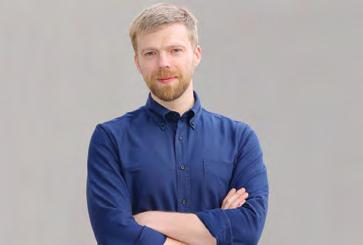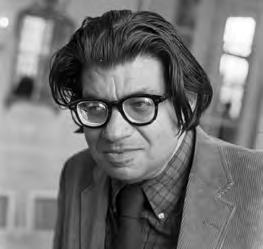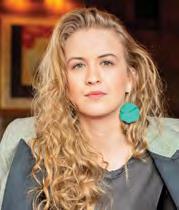Principal Conductor Edward Gardner supported by Aud Jebsen
Principal Guest Conductor Karina Canellakis
Conductor Emeritus Vladimir Jurowski KBE
Patron HRH The Duke of Kent KG
Artistic Director Elena Dubinets
Chief Executive David Burke
Leader Pieter Schoeman supported by Neil Westreich
SATURDAY 22 FEBRUARY 2025
6.30PM
ST JOHN’S CHURCH, WATERLOO
The Chamber Sessions
TONIGHT’S MUSIC
Please note there is no interval in tonight’s concert.
ANDREW NORMAN BORN 1979
THE COMPANION GUIDE TO ROME, FOR STRING TRIO 2010 (32’)
TANIA MAZZETTI violin LPO chair supported by The Candide Trust
SCOTT DICKINSON viola
KRISTINA BLAUMANE cello LPO chair supported by Bianca & Stuart Roden
Andrew Norman is a Los Angeles-based composer and educator. Praised as ‘the leading American composer of his generation’ by the Los Angeles Times, and ‘one of the most gifted and respected composers of his generation’ by The New York Times, Andrew has established himself as a significant voice in American classical music.
His work draws on an eclectic mix of sounds and notational practices from both the avant-garde and classical traditions. He is increasingly interested in storytelling in music, and specifically in the ways non-linear, narrativescrambling techniques from other time-based media like movies and video games might intersect with traditional symphonic forms. His distinctive, often fragmented and highly energetic voice has been cited in The New York Times for its ‘daring juxtapositions and dazzling colours’, in The Boston Globe for its ‘staggering imagination’, and in the Los Angeles Times for its ‘audacious’ spirit and ‘Chaplinesque’ wit.
Composed in 2010, The Companion Guide to Rome is a 30-minute cycle of pieces for violin, viola and cello, and was a Finalist for the 2012 Pulitzer Prize for Music. The composer writes: ‘Each movement is a character study of a particular Roman church. The music is, at different times and in different ways, informed by the proportions of the buildings, the qualities of their surfaces, the patterns in their floors, the artwork on their walls, and the lives and legends of the saints whose names they bear. The title is drawn from the iconic midcentury guidebook to Rome by Georgina Masson.’
© Craig T. Matthew, Matthew Imaging
ROTHKO CHAPEL, FOR CHAMBER CHOIR, SOLO VIOLA, CELESTE & PERCUSSION 1971
CHARLOTTE CORDEROY conductor
NEW LONDON CHAMBER CHOIR
LUCY HUMPHRIS soprano
LOUISE DREWETT alto
SCOTT DICKINSON viola
CATHERINE EDWARDS celeste
ANDREW BARCLAY percussion LPO chair supported by Gill & Garf Collins
Morton Feldman was an innovative 20th-century American composer, renowned for his pioneering contributions to experimental and minimalist music. His works are often characterised by quiet intensity, extended durations, and a focus on subtle shifts in tone and texture, creating a deeply meditative listening experience. As a close associate of composer John Cage and the avant-garde of American painters including Pollock, Rauschenberg and Rothko, Feldman explored the intersections of music, visual art and philosophy. On his 1971 work Rothko Chapel, he wrote:
‘The Rothko Chapel is a spiritual environment created by the American painter Mark Rothko as a place for contemplation where men and women of all faiths, or of none, may meditate in silence, in solitude or celebration together. For this chapel, built in 1971 by the Menil Foundation in Houston, Texas, Rothko painted fourteen large canvasses.
While I was in Houston for the opening ceremonies of the Rothko Chapel, my friends John and Dominique de Menil asked me to write a composition as a tribute to Rothko to be per formed in the chapel the following year. To a large degree, my choice of instruments (in terms of forces used, balance and timbre) was affected by the space of the chapel as well as the paintings. Rothko’s imagery goes right to the edge of his canvas, and I wanted the same effect with the music – that it should permeate the whole octagonal-shaped room and not be heard from a certain distance. The result is very much what you have in a recording – the sound is closer, more physically with you, than in a concert hall.
The total rhythm of the paintings as Rothko arranged them created an unbroken continuity. While it was possible with the paintings to reiterate colour and scale and still retain dramatic interest, I felt that the music called for a series of highly contrasted merging sections. I envisioned an immobile procession not unlike the friezes on Greek temples. These sections could be characterised as follows: I. a longish declamatory opening; 2. a more stationary “abstract” section for chorus and chimes; 3. motivic interlude for soprano, viola and timpani; 4. a lyric ending for viola with vibraphone accompaniment, later joined by the chorus in a collage effect
There are a few personal references in Rothko Chapel. The soprano melody, for example, was written on the day of Stravinsky’s funeral service in New York. The quasi-Hebraic melody played by the viola at the end was written when I was fifteen. Certain intervals throughout the work have the ring of the synagogue. There were other references which I have now forgotten...’
CHARLOTTE CORDEROY CONDUCTOR
The 2024/25 season sees Charlotte debut with English National Opera (conducting The Turn of the Screw), Volksoper Wien (My Fair Lady) and South Australian Opera (Jonathan Dove’s Flight). She also assists Barbara Hannigan at the London Symphony Orchestra, covers Le nozze di Figaro at Glyndebourne Festival Opera, and continues as Assistant Conductor of the City of Birmingham Symphony Orchestra.
Last season’s highlights included returns to the Royal Philharmonic Orchestra (having previously conducted them at the Three Choirs Festival), and to Opera Holland Park for Il barbiere di Siviglia Charlotte also debuted with the Swedish Chamber Orchestra, co-conducting Stravinsky’s The Rake’s Progress with Hannigan in Örebro, Stockholm and Cologne.
Born in 1997, Charlotte graduated from Oxford University with First Class Honours in Music. She went on to study conducting at the Royal Academy of Music, where she is currently Musical Director of their inaugural Junior Musical Theatre Department. She has assisted on a number of new commissions at the Aldeburgh Festival.
NEW LONDON CHAMBER CHOIR
For four decades, NLCC has been one of the outstanding groups at festivals across Europe and the UK. Specialising in contemporary works, we perform uncompromisingly avant-garde music of all periods and have a unique record of commissioning and premiering new works for mixed chorus.
After the COVID-19 pandemic, we returned to performance in December 2023, representing a relaunch of New London Chamber Choir activities with a programme of dark then light. Last April, we performed new works at the Royal Academy of Music in London. In June, we recorded for Holly Herndon and Mat Dryhurst’s project ‘The Call’, and in July performed a programme of new and recent works at Waterloo Festival. Most recently, we performed carol concerts in London and at Folkestone New Music, featuring works commissioned by Stephen Cleobury in the 1980s, 1990s & 2000s for the annual Festival of Nine Lessons and Carols at King’s College Chapel.
ENJOYED TONIGHT’S CONCERT?
We hope you enjoy tonight’s performance. Could you spare a few moments to complete a short survey about your experience? Your feedback is invaluable to us and will help to shape our future plans.
Just scan the QR code to begin the survey. Thank you!
NEXT LPO CONCERT AT ST JOHN’S WATERLOO
FRIDAY 7 MARCH 2025, 6.30PM ECHOES OF NOW
HANNAH KENDALL Vera
TANIA LEÓN String Quartet No. 2
JESSIE MONTGOMERY Break Away
DANIEL KIDANE Foreign Tongues
BRIAN RAPHAEL NABORS Jump
TICKETS £12–£15
LPO.ORG.UK/THECHAMBERSESSIONS LPO TICKET OFFICE: 020 7840 4242 (MON–FRI 10AM–5PM)







